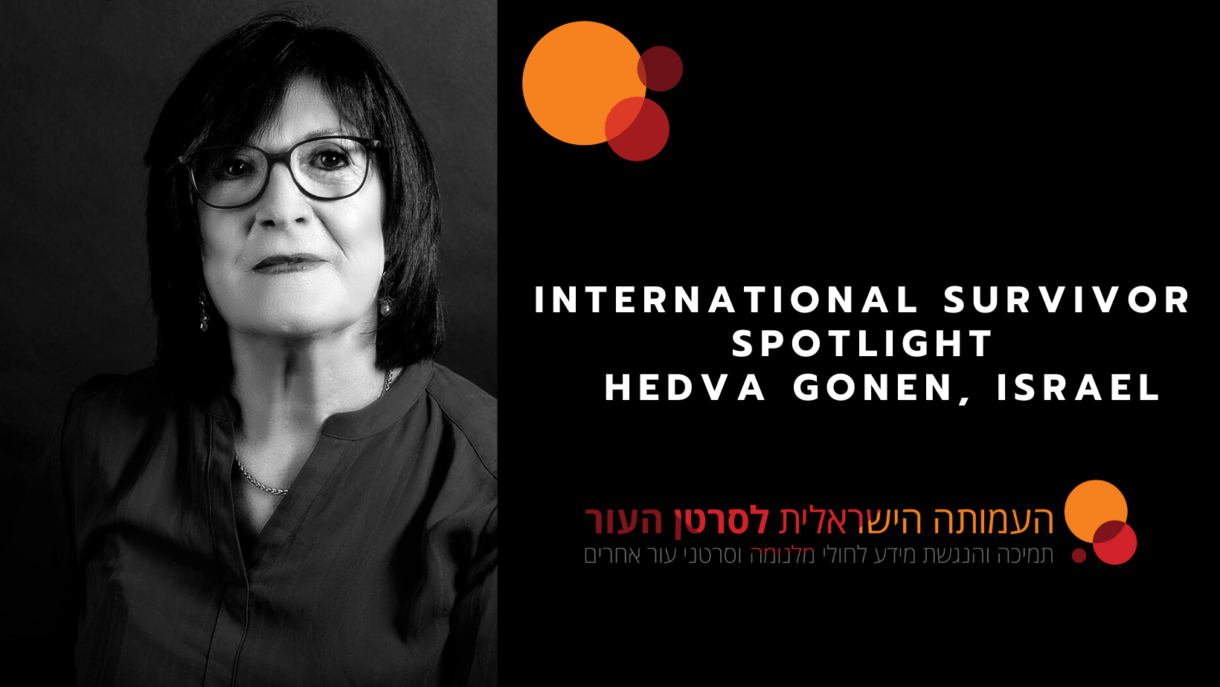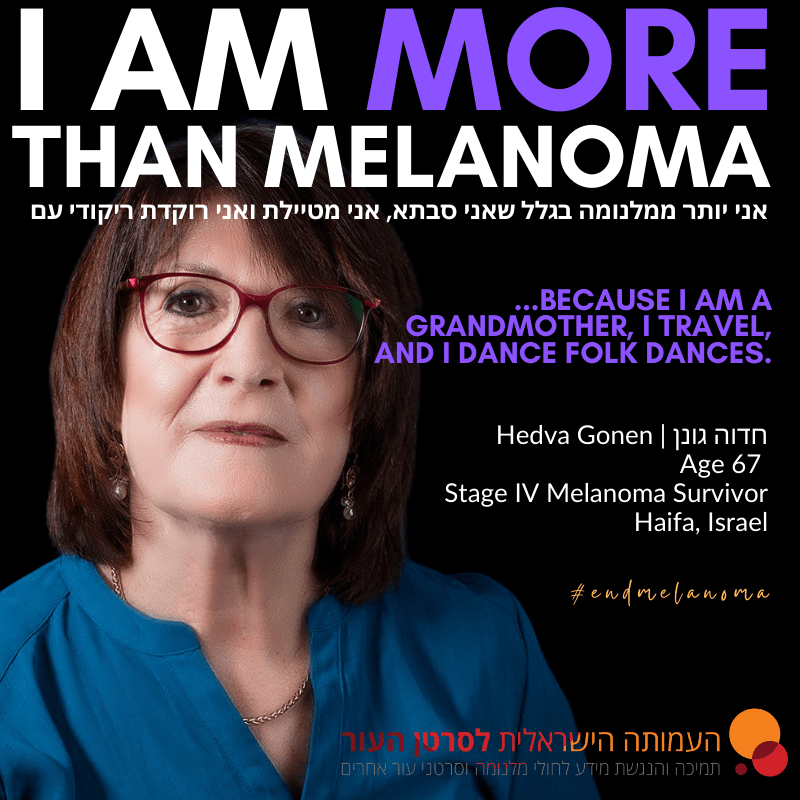Featured Survivor Story:
International Survivor Spotlight: Hedva Gonen, Israel

By Mara Klecker
Hedva Gonen received her diagnosis via email while sitting alone in her home in Haifa, Israel. As a biochemist, she didn’t need to turn to the internet to understand the gravity of the words “metastatic melanoma, Stage IV.”
The fear came first, followed by a rush of anxiety as she wondered how many months she may have left. Then, something she can only explain as a powerful voice turned that worry into a calm determination. She decided she would give it her all to overcome the disease — a commitment that stayed with her through rounds of tough treatments and one that also led her to found the Israeli Skin Cancer Association in 2015.
“I knew there was no cure at that time, and I was determined to look worldwide for what would save me,” she said.
Her diagnosis came in early 2013 after she had a fever for several days and started feeling pain in her upper right abdomen. Her doctor worried about sending her home without answers and recommended that she visit the emergency room. At the hospital, an ultrasound and CT scan showed a 7 cm tumor in her liver as well as tumors in her spleen and lungs. Three weeks later, a biopsy revealed the tumors were melanoma.
In the spring of 2013, Hedva underwent IL-2 combined with chemotherapy, a treatment that triggered severe flu-like symptoms, intense weakness, and itching.
 From July 2013 to September 2015, Hedva participated in a Phase 1 clinical trial at Memorial Sloan Kettering Cancer Center in New York City, where she received a combination of Ipilimumab and Nivolumab. Since completing the immunotherapy, she visits her dermatologist for scans about twice a year.
From July 2013 to September 2015, Hedva participated in a Phase 1 clinical trial at Memorial Sloan Kettering Cancer Center in New York City, where she received a combination of Ipilimumab and Nivolumab. Since completing the immunotherapy, she visits her dermatologist for scans about twice a year.
Before her own diagnosis, Hedva didn’t personally know anyone with melanoma. The first few months of her melanoma journey were the hardest, she said — she didn’t have anyone else she could talk to about what she was going through and wasn’t getting information about options like clinical trials.
“I felt like everything depended on me,” she said.
Her experience as a patient prompted her to set up the association, which is aimed at connecting melanoma patients with each other and finding better ways to understand and manage the disease.
Though Hedva feels that skin cancer awareness has been spreading in Israel, she still sees groups of young people lying on the beach for hours to tan. That’s why she’s pushing the association’s 2021 message: “There is no color in the world that is worth cancer.”
“I think we should teach children in school about how to protect their skin in the same way we teach them how to be safe while crossing the road,” she said.
The most rewarding part of working with the association is hearing the relief in the patients’ voices when they first call into the group’s hotline.
They often dial in just hours after their diagnosis, when they are scared and looking for answers and support. Hedva remembers that fear and remembers not being able to find answers and support because there wasn’t an association like hers.
She reassures them that this is a new era and there is a lot of hope for melanoma patients, thanks to new treatments and the work of organizations like AIM at Melanoma and the Israeli Skin Cancer Association.
“I always feel that the patient comes out of our conversation more optimistic and ready for their first oncology visit,” Hedva said.
Hedva initially found out about AIM in 2015 through an Israeli professor who knew Val Guild, the founder of AIM at Melanoma, and helped make the introduction after Val continuously asked if Israel had a melanoma association.
Hedva, and the Israeli Skin Cancer Association, is one of AIM’s international advocacy partners, a network called MIPAC—Melanoma International Patient Advocacy Coalition. AIM founded this international group to fill a need in countries without strong patient advocacy organizations. AIM provides both funding and content for websites, social media campaigns, and traditional media campaigns. Many of AIM’s educational materials are translated for use in these countries/regions. In turn, the partner groups help take AIM’s mission global, and are able to educate and provide for their own community of melanoma patients and their families.
In addition to Israel, the MIPAC’s members are located in Australia, Brazil, Canada, Eastern Europe, France, Italy, Latin America, Portugal, Spain and the United Kingdom.






